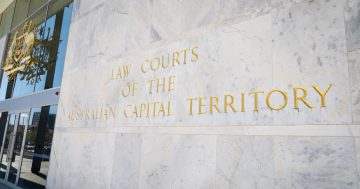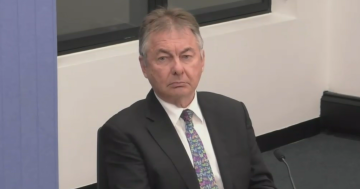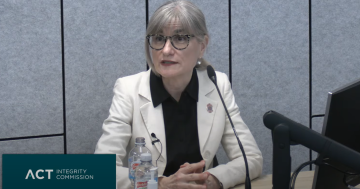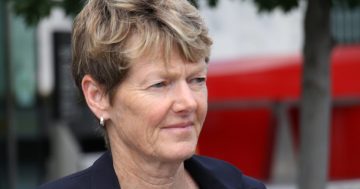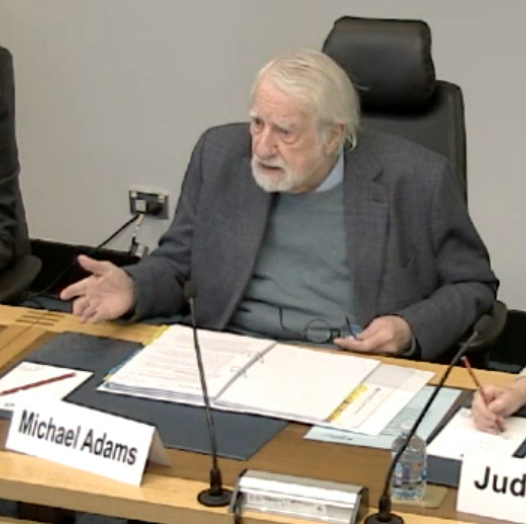
Michael Adams says the ACT Integrity Commission is assisting ACT Policing’s investigation into possible embezzlement in the public service. Photo: Screenshot.
ACT Integrity Commissioner Michael Adams has revealed an investigation into potential embezzlement in the ACT public service is underway.
The commission fronted budget estimates on Monday (28 July) during which Mr Adams was asked about his office’s role in managing conflicts of interest in the public service.
He responded that it was an area they could investigate using their “coercive powers”, but it could also pivot to gather evidence to assist police.
“One investigation … it’s an [alleged] embezzlement, I won’t say anything more about that … [but] we are exploring ways in which we can work with other interested participants,” Mr Adams said.
ACT Policing declined to comment when contacted by Region.
Mr Adams also gave updates on other investigations being undertaken by the Integrity Commission.
He confirmed there would be one final special report into the procurement processes out of CIT, which would reveal further “egregious conduct”.
The latest update was released on Friday (25 July), outlining that potential criminal offences may have been committed by former CIT CEO Leanne Cover and then-Executive Director of Education Andrew Whale.
The matter is now in the hands of the ACT Director of Public Prosecutions.
“I have not recommended or directed in any way [or] attempted to interfere in the exercise of [the DPP’s] discretion,” Mr Adams said.
“What I have done is outline the evidence, so it could amount to criminal offences, but that’s a matter for [the DPP] to decide whether the evidence would justify bringing the cases before a jury.
“But I’m not a prosecuting authority.”
The Integrity Commission’s final CIT procurement report is expected to be released by the end of the year.
Mr Adams said the entire CIT saga revealed issues that he felt could be applied more widely to the public service, and the next report would contain a number of lessons.
“What troubles me with [the report] is that other senior public servants or officials or our members would see this as so serious that ‘that’s not going to happen’ or therefore dismiss it as irrelevant to their own experience or their own work,” he said.
“The important thing is each of these cases have real lessons [of] much wider significance.”
The commission’s focus has primarily shifted to Operation Kingfisher, which is investigating why a tender for the multi-million dollar Campbell Primary School upgrade was awarded to Lendlease when Manteena was identified as the preferred tenderer.
The investigation is complete, but a report is yet to be issued.
Mr Adams revealed that the process has been held up after one witness objected to his office’s request to access their phone, launching legal action in the ACT Supreme Court.
“It’s the nature of the beast, I’m afraid,” he said.
“[But] this phone I’m talking about, which is the subject of litigation, [there are] 1.4 million items on it.
“I say to the Solicitor General: you’ve got to look at public interest immunity and the government’s legal professional privilege, and their silence at the end of the phone.”
The report had previously been held up after former Education Directorate head Katy Haire went to the ACT Supreme Court to request a judicial review of the Integrity Commission’s decisions during the investigation.
She dropped the court case earlier this year.
The Integrity Commission has five other open investigations, which Mr Adams did not want to discuss in the public domain, but he hoped some would wrap up before the end of the year.
Items on the agenda include examining ICT procurement in healthcare, which Mr Adams described as a “fraught and difficult area”, and political lobbying.
On political lobbying, recruitment is underway to find suitable lawyers and investigators to undertake the work.
But background research is occurring in the meantime.
“Donations are the lifeblood of political parties for elections, so if one is going to have sensible discussions, they have to be detailed, they have to be candid and they have to be with interlocutors who can be trusted so that we can work out practical ways in which … guidelines, at least, can be developed,” Mr Adams said.
“Frankly, having a junior investigator turning up to an officer – how much candour, how much maturity is going to be brought to a dialogue of that kind?”
Terms of reference for that inquiry are yet to be established.
Original Article published by Claire Fenwicke on Region Canberra.


